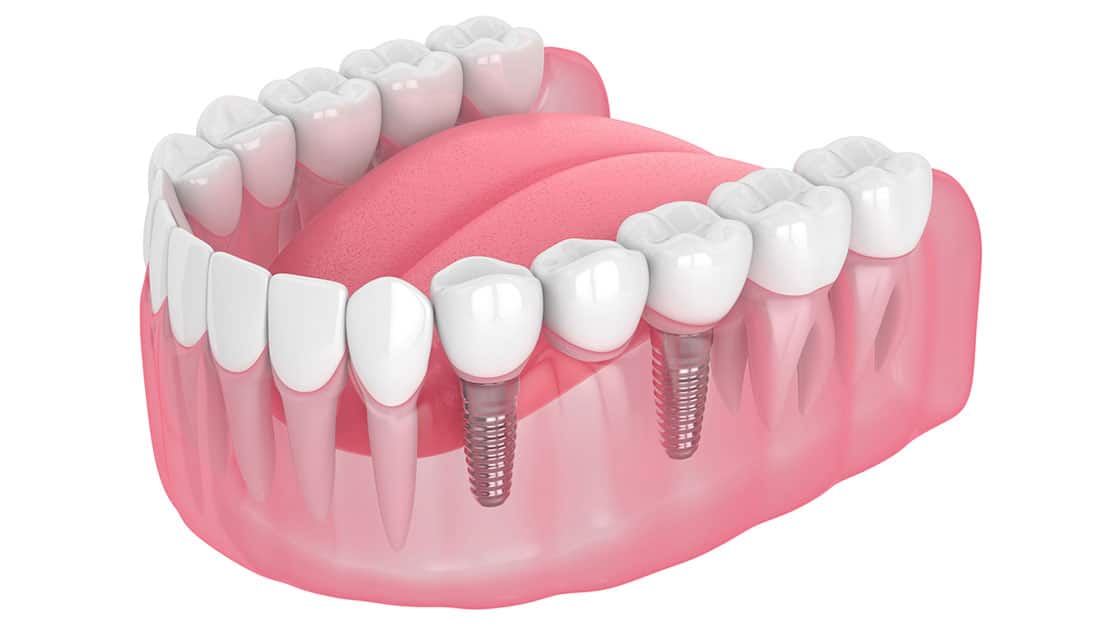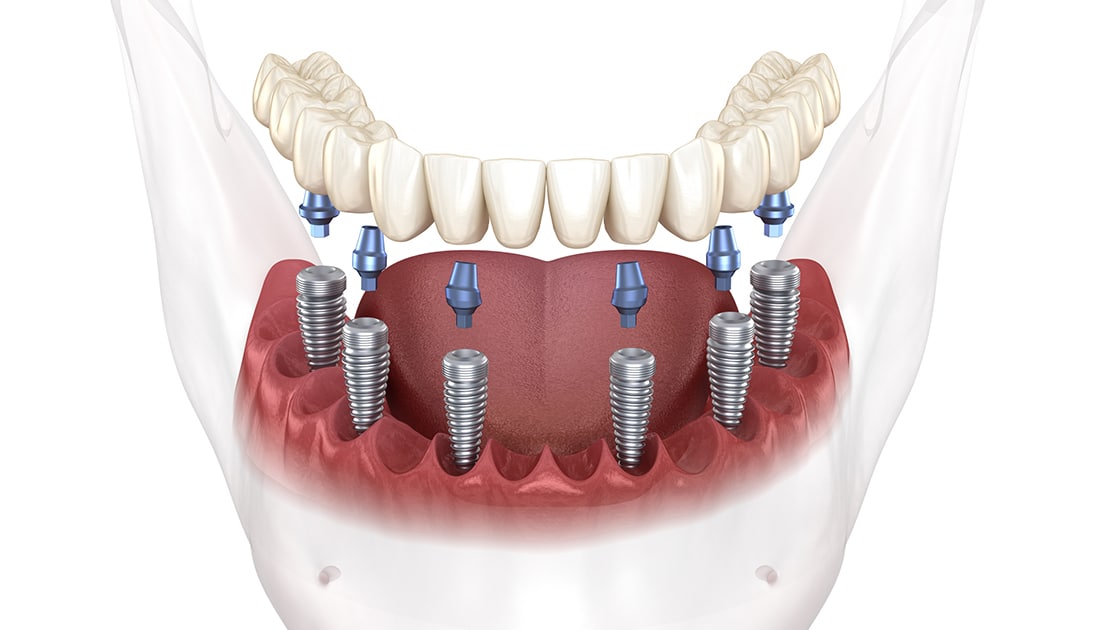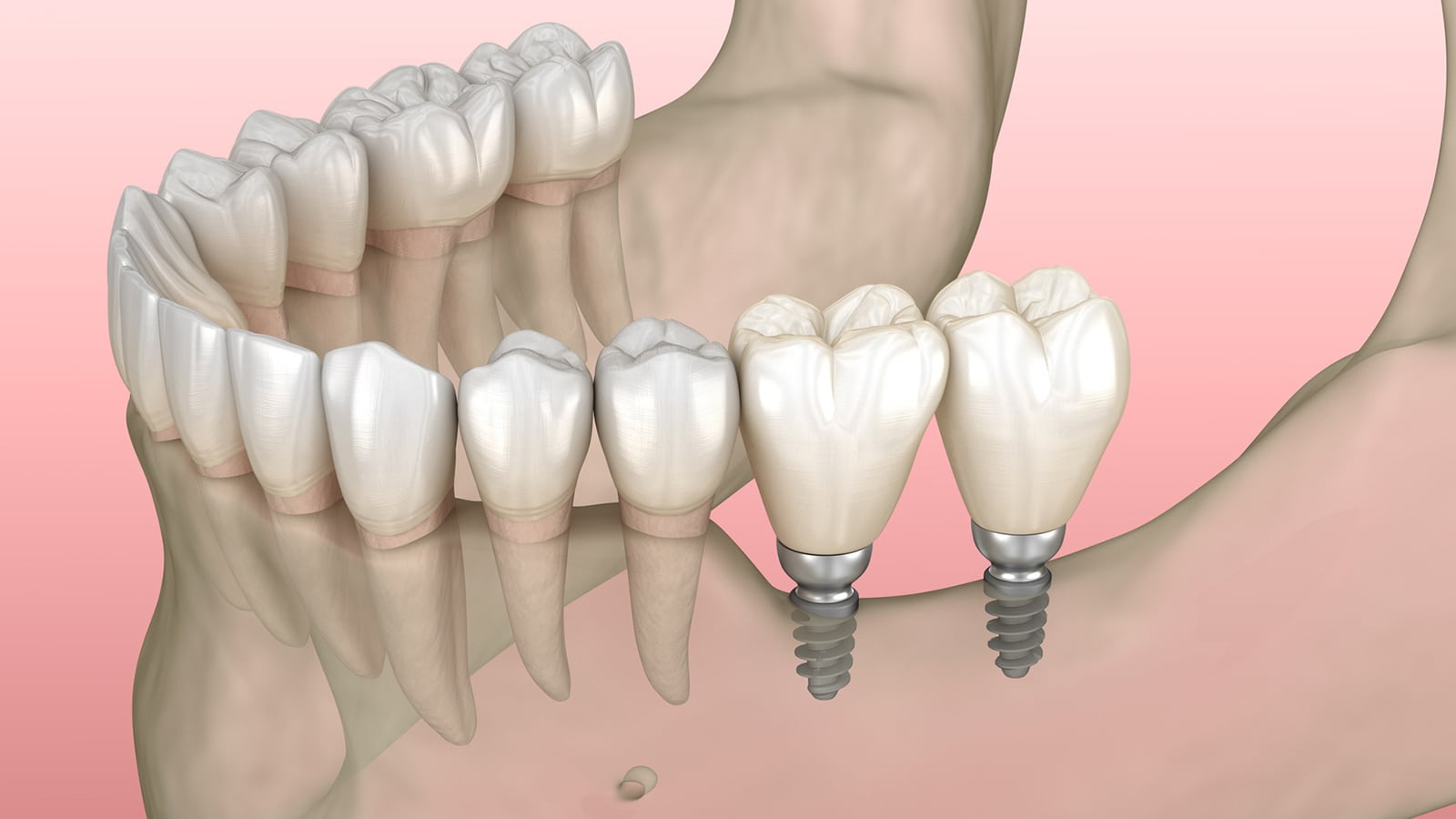
What is a Dental Implant?
Dental implants are small anchors made of a biocompatible metal called titanium that are placed in the jawbone. Dental implants are the replacement of tooth roots in the mouth. Once placed, the anchors begin to fuse with the bone over the course of a few months. After the fusing process, known as osseointegration, abutment posts are inserted into the anchors to allow for the permanent attachment of the replacement teeth.
Implants are the best solution for simulating the look, feel, and function of natural teeth. Dental implants do much more than replace missing teeth, they also help maintain the health of neighboring teeth more predictably and reliably. They also help maintain bone structure, provide the ability to chew healthy food and give patients the confidence to smile.
Implant Supported Bridges

An implant supported bridge is a restorative solution for spaces where three or more adjacent teeth are missing. This restoration typically requires two implants to support the porcelain bridge. The bridge provides a functional and aesthetic replacement for a patient’s natural teeth.
What are the advantages of an implant supported bridge?
Because of the natural look and feel of the porcelain and the functional stability provided by the implants, implant supported bridges are an effective solution to replace multiple missing teeth.
A traditional bridge uses teeth on either side of the gap where teeth are missing for support. An implant supported bridge uses two or more dental implants rather than the adjacent teeth. When a bridge uses natural teeth for attachment, the natural teeth must be prepped for crowns and are then subject to increased stress which may be damaging – particularly if the existing tooth, roots, or surrounding bone structure are already compromised. A dental implant supported bridge replaced your missing teeth and avoids putting any additional stress on your natural teeth.
Fully Edentulous (Toothless) Solutions

For patients missing many or all of their teeth, implant retained or implant supported dentures may be an alternative to traditional dentures. These solutions can simulate the look and feel of natural teeth and stay fixed in place with the implants acting as anchors. Using implants for retention or the support of dentures allows for a smaller and more comfortable base and less shifting of the prosthesis during use.
An implant retained denture requires the placement of four to six dental implants as “anchors” to provide a sturdier fit and minimal mobility for your denture. No adhesives and pastes are needed to secure your new denture, so you can eat and speak with comfort and confidence.
Available for full or partial dentures, implant supported dentures require the placement of two or more dental implants to secure the dentures in the mouth. With implant supported dentures, there is no plate covering the roof of the mouth, so speaking and eating are more natural and comfortable than with traditional dentures. If a removable denture is selected, the denture will “snap” onto the implant and can be removed for cleaning at night.
This procedure is a unique implant solution that allows patients with a completely edentulous (toothless) upper or lower arch to replace all of the teeth in that arch using only four to six implants as anchors. For qualifying patients, our doctors may be able to complete the removal of all teeth and the placement of a temporary arch on the same day.
Mini Dental Implants (MDIs)

When small spaces or inadequate bone mass in the jaw prevents traditional implant placement, a mini dental implant (MDI) may be a great alternative. Mini Dental Implants are similar to regular implants but, as the name suggests, are significantly smaller in diameter, and the placement procedure is minimally invasive, often requiring only local anesthetic and no sutures. For this reason, MDIs can usually be placed with the final replacement tooth on the same day.
How are mini dental implants different from standard dental implants?
In traditional implants, an abutment is attached to the titanium implant screw, and the restoration is then placed on the abutment as shown here.
MDIs are approximately half the diameter of a traditional implant and use a titanium post, rather than a screw. Instead of an abutment piece that supports the final restoration, MDIs use a ball and socket attachment system. The ball on the end of the titanium post (shown above) provides the attachment point for the o-ring in the replacement tooth.
Similarities between MDIs and full size dental implants:
- The implant is inserted into the jawbone.
- The implants, once inserted into the jawbone, are fixed in place.
- The implant serves to replace the tooth root and anchor replacement teeth.
- The placement of the implant can prompt bone regeneration around the placement site.
- The implant can be used to support one or more teeth for crowns or bridges and can also help provide support for removable lower arch dentures.
MDIs may be preferable to full size dental implants in the following situations:
- Bone mass in the jaw is insufficient to support a full size implant screw.
- There is a small space or gap into which to insert the fabricated tooth (such as an incisor as opposed to a molar).
- Children or young adults have congenitally missing teeth.
- Minimally invasive techniques are required due to health or other reasons.